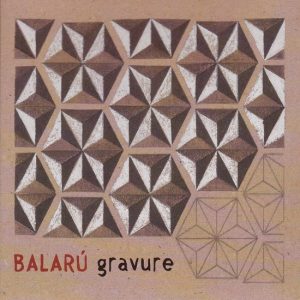 De band Balarù brengt, na jarenlang etnomusicologisch onderzoek, hun album ‘Gravure’ op de markt met muziek uit Piemonte. Een provincie in het noorden van Italië met als hoofdstad Turijn. Balarù betekent ‘voor wie van dansen houdt’ in het Piemonte’s dialect, een metafoor voor een prachtig viertal.
De band Balarù brengt, na jarenlang etnomusicologisch onderzoek, hun album ‘Gravure’ op de markt met muziek uit Piemonte. Een provincie in het noorden van Italië met als hoofdstad Turijn. Balarù betekent ‘voor wie van dansen houdt’ in het Piemonte’s dialect, een metafoor voor een prachtig viertal.
English version below
De groep Balarù trekt met hun album ‘Gravure’ een prachtig muzikale etnomusicologische ‘houtsnede’ door Piemonte. Nadat deze groep jarenlang concerten gaf door Europa, besluiten de vier musici in september 2015 melodieën en liedjes te verzamelen, deze te arrangeren en ze uit te brengen op hun album ‘Gravure’. Het resultaat is een zeer spontane CD die klinkt zoals ze live ook klinken. Puur, ongepolijst en vol overgave. Balarù is een kwartet dat schittert in enthousiasme maar ook in kwaliteit, zichzelf begeleidend op draailier, bouzouki, banjo, doedelzak en diatonische accordeon, aangevuld met gastmusici op slagwerk. De groep gaat dus jarenlang op zoek naar lokale melodieën, maar borduurt ook voort op onderzoek uit de jaren ’60, waar melodieën en liedjes werden gered uit de vergetelheid. Sommige van deze liedjes komen van oude tapes, werden op locatie opgetekend of hebben de ‘mond-op-mond-overlevering’ doorstaan. Maar er zijn ook enkele nieuwe stukken te vinden op ‘Gravure’, zoals ‘Il Profeta’, een stuk dat wordt opgedragen aan de bewoners van de schitterende Lanzo Valleien of ‘Crepuscolar’ dat werd geschreven door draailier-speler Francesco Cavallero op een gedicht van Tavo Burat. De liederen op dit album handelen over liefde, de natuur, drinkgelag en feesten zoals Carnaval. Fraai is de stem van (gast)zangeres Laura Torterolo die in ‘Dessur la fleur da lys’ zingt over het gedwongen verblijf met een legerkapitein. Een lied van Franse origine, maar dat ook in Piemonte zeer bekend is. Balarù brengt met ‘Gravure’ op sublieme wijze een stukje Europa muzikaal tot leven; zelfs ‘voor wie niet van dansen houdt‘, is dit album zeer de moeite waard.
English version
After years of ethnomusicological research and concerts all over Europe, Balarù released their album ‘Gravure’ with music from Piedmont. A province in the north of Italy with Turin as its capital. Balarù means ‘for those who love dancing’ in the Piedmont’s dialect, a metaphor for the music of this excellent quartet.
With their album ‘Gravure’, Balarù draws a beautiful musical ethnomusicological ‘woodcut’ through Piedmont. In September 2015, after years of concerts throughout Europe, these four musicians decide to collect melodies and songs, arrange them and release them on their album ‘Gravure’. The result is a very spontaneous CD that sounds as they play live. Pure, unpolished and full of spirit. Balarù is a quartet that shines in enthusiasm but also in quality, accompanying themself on hurdy-gurdy, bouzouki, banjo, bagpipes and diatonic accordion, supplemented with guest musicians on percussion. So, for years the group collected local melodies and elaborates on research from the sixties where melodies and songs were saved from oblivion. Some songs come from old tapes, some were recorded on location or have come through the ‘mouth-to-mouth surrender’. But there are also some new pieces to be found on ‘Gravure’, such as ‘Il Profeta’, a piece dedicated to the inhabitants of the beautiful Lanzo Valleys or ‘Crepuscolar’ written by hurdy-gurdy player Francesco Cavallero on a poem by Tavo Burat. The songs on this recording are about love, nature, drinking and festivities such as Carnival. Fine is the voice of (guest) singer Laura Torterolo who sings in ‘Dessur la fleur da lys’ about her forced stay with an army captain. A song originally from France but well known in Piedmont. Balarù gives a wonderful musical voice to a piece of Europe in a sublime manner; even ‘for those who do not like dancing’, this album is more than worth it!
- Balarù: ‘Gravure’ (Felmay)
© Mattie Poels.

Geen reacties